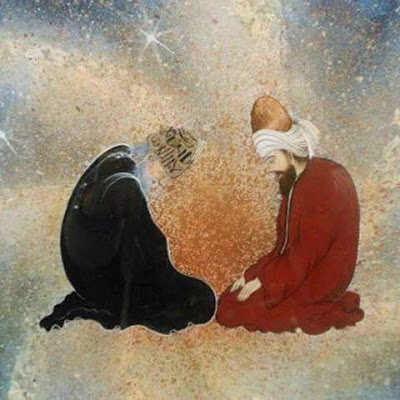What Sort Of Stride?
Know that studying is also a great veil. Man goes into it, as if he has gone into a well or a moat. Then at the end, he regrets it, because he comes to know that he was kept busy with licking the pot so that he would be held back from the subsistent, endless food. After all, words and sounds are the pot.
At the time of death, Sana'i was saying something under his tongue. When they put their ears next to his mouth, they heard,
"I've turned away from all I've said -
There's no meaning in speech, no speech in meaning."
O servant of the body! How long will you run in its service?
They say that the poem is by Abu'l-Ala Ma'arri. His words aren't much. It's not like they say, that he was strong. Look at what the Sage says:
"My knowledge reached the point
that I came to know I'm ignorant."
From this one word you catch the scent of something. They showed him something:
"I came to know that what I said from the beginning to end was nothing."
Whoever is more learned is further from the goal. The more abstruse is his thinking, the further he is. This is the work of the heart, not the forehead.
That's the story of the one who found directions to a treasure:
"Go out to such and such a gate. There's a dome. Put your back to the dome, your face toward the Kiblah, and let an arrow go. Wherever the arrow falls, there is the treasure."
He went and let fly. No matter how much he tried, he didn't find it. Then the news reached the king. The master archers let fly and of course no trace appeared.
When he referred back to God, he received an inspiration: "We did not say that you should pull the bow."
He came, placed the arrow in th bow and it fell in front of him. When solicitude comes, Two strides and he arrived.
So what does this have to do with practice? What does it have to do with ascetic discipline? Whoever threw the arrow further was more deprived. This is because you need a "stride" to reach the treasure. And what sort of stride! Which is that stride? He who knows his soul knows his Lord. The one they named "commanding to evil" is itself at peace.
Shams
"Me & Rumi" William C. Chittick - The Profit and Loss of Study
At the time of death, Sana'i was saying something under his tongue. When they put their ears next to his mouth, they heard,
"I've turned away from all I've said -
There's no meaning in speech, no speech in meaning."
O servant of the body! How long will you run in its service?
They say that the poem is by Abu'l-Ala Ma'arri. His words aren't much. It's not like they say, that he was strong. Look at what the Sage says:
"My knowledge reached the point
that I came to know I'm ignorant."
From this one word you catch the scent of something. They showed him something:
"I came to know that what I said from the beginning to end was nothing."
Whoever is more learned is further from the goal. The more abstruse is his thinking, the further he is. This is the work of the heart, not the forehead.
That's the story of the one who found directions to a treasure:
"Go out to such and such a gate. There's a dome. Put your back to the dome, your face toward the Kiblah, and let an arrow go. Wherever the arrow falls, there is the treasure."
He went and let fly. No matter how much he tried, he didn't find it. Then the news reached the king. The master archers let fly and of course no trace appeared.
When he referred back to God, he received an inspiration: "We did not say that you should pull the bow."
He came, placed the arrow in th bow and it fell in front of him. When solicitude comes, Two strides and he arrived.
So what does this have to do with practice? What does it have to do with ascetic discipline? Whoever threw the arrow further was more deprived. This is because you need a "stride" to reach the treasure. And what sort of stride! Which is that stride? He who knows his soul knows his Lord. The one they named "commanding to evil" is itself at peace.
Shams
"Me & Rumi" William C. Chittick - The Profit and Loss of Study




Yorumlar
Yorum Gönder